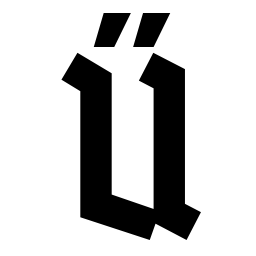Fundamental types and operations for them¶
void type¶
void type is used mostly as return type for functions which return nothing.
It has zero size.
It may be initialized with empty initializer.
All void values are equal.
It’s possible to assign void values, pass them by value or by reference into a function, return values and references of this type.
Boolean type¶
Ü has bool type.
The only possible values are true and false.
There are following operations for bool values:
&- Binary logical AND.|- Binary logical OR.^- Binary logical XOR.!- Unary logical NOT.&&- Lazy logical AND.||- Lazy logical OR.
Result of each of these operations for bool is also of bool type.
Numeric types¶
Ü has several numeric types - integer and floating point. Integer types are divided into signed and unsigned.
Floating point types:
f32f64
Signed integer types:
i8i16i32i64i128ssize_type
Unsigned integer types:
u8u16u32u64u128size_type
Numeric suffix of the type name means its size in bits.
Following arithmetic operations are possible for values of numeric types:
+- binary addition.-- binary difference.*- binary multiplication./- binary division.%- binary reminder.-- Unary minus. It is equivalent to subtraction of a value from 0.
The exact behavior of an arithmetic operation is different for different numeric type kinds. Operations for integer types may overflow. Operations for floating point types may be saturated instead.
The result of the division for floating point values is nearest floating point value, for integers - nearest integer value.
For integers division result by zero is undefined, for floating point types result is ±infinity or NaN.
Bitwise operations for integer types¶
For values of integer types following bitwise operations may be used:
&- Binary bitwise AND.|- Binary bitwise OR.^- Binary bitwise XOR.~- Unary bitwise inversion.
Shifts¶
It’s possible to use bit shifts for values of integer types - left shift << and right shift >>.
The first operand is a shifted value, the second - number of bits to shift.
<< operator performs left shift.
The most left bits are missing, the most right bits are replaced by zeros.
>> operator performs right shift.
The most right bits are missing, the most left bits are replaced by 0 (for unsigned types) or by sign bit (for signed types).
size_type¶
size_type is an unsigned integer type, distinct from other unsigned integers.
Its size is equal to pointer size and thus depends on the target architecture.
Its internal represenation is the same as one of unsigned integer types with the same size.
ssize_type is like size_type, but it is signed.
The result of raw pointer differense has this type.
char types¶
There are following char types in Ü:
char8char16char32
Numeric suffix of the type name means its size in bits.
Unlike numeric types there is no arithmetic and bitwise operations for char types. But it is possible to compare values of char types.
Raw data representation types¶
Ü has following types for raw data representation:
byte8byte16byte32byte64byte128
They exist to represent raw bytes and sequences of bytes (2 bytes, 4 bytes, etc.). The only possible operation for values of these types is equality comparison. It is possible to convert values of byte-types into numeric and char values and vice versa. Conversion is performed by simply reinterpret bit-representation (even for floating-point types).
Comparison¶
There are several comparison operators in Ü.
Result of all of them is of bool type.
There are equality comparison operators == and != for each fundamental type.
There are also order comparison operators for types except bool, void and byte types:
<- Less.<=- Less or equal.>- Greater.>=- Greater or equal.
For numeric values natural comparison order is used. For chars comparison follows char number.
There are some caveats for floating point comparisons:
+0and-0have different bit representation but in comparison are equal.Any comparison against
NaNexcluding!=returnsfalse.!=againstNaNreturns alwaystrue. Also==with bothNaNoperands returnsfalse. From all this follows thatNaNisn’t equal to any value, even to itself.
For all types, for which order compare operators are supported, special operator <=> exists.
It returns result of i32 type, -1 if left operand is less than right operand, +1 if left operand is greater that right operand, 0 if operands are equal.
Ternary operator¶
Ü has operator for selection of one of two variants - ternary operator.
It consists of three expressions separated by ? and : inside ().
The body consists of a logical expression, of an expression for true value after ? and of an expression after : for false value.
It works like this: evaluates first expression (that should be of bool type, then if its result is true - evaluate the second expression - else - the third.
fn Foo()
{
auto x= ( true ? 1 : 2 ); // "x" will be equal 1
auto y= ( false ? 0.5f : 3.5f ); // "y" will be equal 3.5
var i32 mut z= 0, mut w= 0;
( x == 1 ? z : w )= 666; // ternary operator may be applied even for mutable references
}
Operators priority¶
In a complex expressions consisting of multiple operators calculation is performed in order of operators priority. Unary operators have highest priority - are applied before any others. Binary operators are calculated in priority from weak to strong:
/,*,%+,-<<,>><=><,<=,>,>===,!=&^|&&||
The priorities above are like in C++.
Binary operator with the same priority are evaluated in left-to-right order.
It is possible to use () in order to change default priority.
